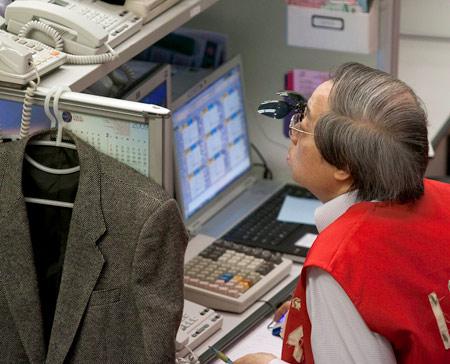
A trader monitors IPO transactions of China Minsheng Banking Corp at the Hong Kong Stock Exchange. A new rivalry is developing between China's Hong Kong and Shanghai exchanges. [Bloomberg]
In the IPO boom that has swept through Asia this year, the Hong Kong Stock Exchange emerged as the world's top producer of new, publicly traded companies.
In Shanghai, it was a different story. The local stock exchange produced a fraction of the public offerings seen by its neighbor, just a two-hour plane ride south.
Given the cutthroat rivalry between stock exchanges in New York and Europe, this southern China head-to-head version may appear subdued.
But some investment bankers and industry experts in Hong Kong say it's only a matter of time before their stock exchange loses market share to Shanghai - should China decide to twist open capital controls.
"In the long run, there will be an impact on Hong Kong's international capital market position, as more firms will choose listings in Shanghai to tap the surging growth of the country," said Self Li, head of mutual fund sales in Asia at Baring Asset Management.
For now, the only publicly traded companies in Shanghai are China-based. But a list is growing of international names with their sights set on trading there, including HSBC, Europe's largest bank.
From January to December, 47 IPOs in Hong Kong raised a total $22.8 billion, according to Thomson Reuters data. In the same period, Shanghai saw just six IPOs for a total of $13.8 billion.
During the 2007 bull market, the story was much the same, with Hong Kong churning out more than twice the volume of IPO proceeds than Shanghai, although the average Shanghai offering size has remained bulky at more than $1 billion.
Challenge from Shanghai
Hong Kong's capital market grip might soon be tested.
The Shanghai Stock Exchange plans to launch its international board next year and will aggressively pursue foreign issuers.
The city's vice mayor, Tu Guangshao, has told local media the international board will be part of a major effort to build Shanghai's exchange into one of the world's largest stock exchanges.
If the size of HSBC's possible listing is any indication, considering reports that the bank could raise 50 billion yuan next year, foreign listings might quickly propel Shanghai above other financial centers.
Even bankers based in Hong Kong and profiting from the deal flow believe the tide will change, as Beijing is expected to open its markets further over time.
"The CSRC (China Securities Regulatory Commission) wants to develop the local market gradually and consistently," said a Hong Kong-based equity capital markets banker, who did not want to be identified.
"Over time, China's capital market will open up. It's inevitable," the banker said.
At the same time, Shanghai might benefit from another development - the central government's push to have big State-owned enterprises list domestically first, and only later go to Hong Kong.
Mainland companies at one time found it easier to float shares in Hong Kong first and then go to Shanghai for a second listing.
But the Chinese government's stance is changing amid domestic complaints that large Chinese IPOs should benefit mainland investors first.
Chinese officials in charge of State-owned enterprises (SOEs) said in late 2007 during the market bull run that the government encouraged good-quality SOEs to list first in mainland markets.
Hong Kong wasn't always on top, in any case.
From 2001 through 2003, Shanghai cranked out more IPOs and more proceeds. And in 2004, Shanghai again outperformed Hong Kong in IPO volume.
It was at the start of 2005 that Hong Kong began to pull ahead. Some believe that dominance will hold steady as an opening of capital controls in China presents global investment opportunities to domestic investors.
Once China's capital markets are open, "Shanghai will realize that the apparent valuation advantage it appears to give people will not remain once money can go anywhere in the world, including mainland investors' money", said Ronald Arculli, chairman of the Hong Kong Stock Exchange.
The chairman has a vested interest in keeping Hong Kong ahead. Where the former British colony might find unwanted competition is not just Shanghai, but Shenzhen and even the United States.
And there are hurdles for Shanghai to build up a mature international board quickly, such as a lack of a strong capital foundation, regulatory regime and supporting services, plus accounting and legal frameworks that are less developed than in places like Hong Kong.
But the market's perception of the China opportunity may outweigh the safety of listing in a place like Hong Kong.
"The inevitable opening of the Chinese market is good news for the overall market, in terms of competition and opportunity. That will be the next step when capital controls come off," said the equity capital markets banker.
"And Hong Kong will struggle to regain its regional leadership," he said.





